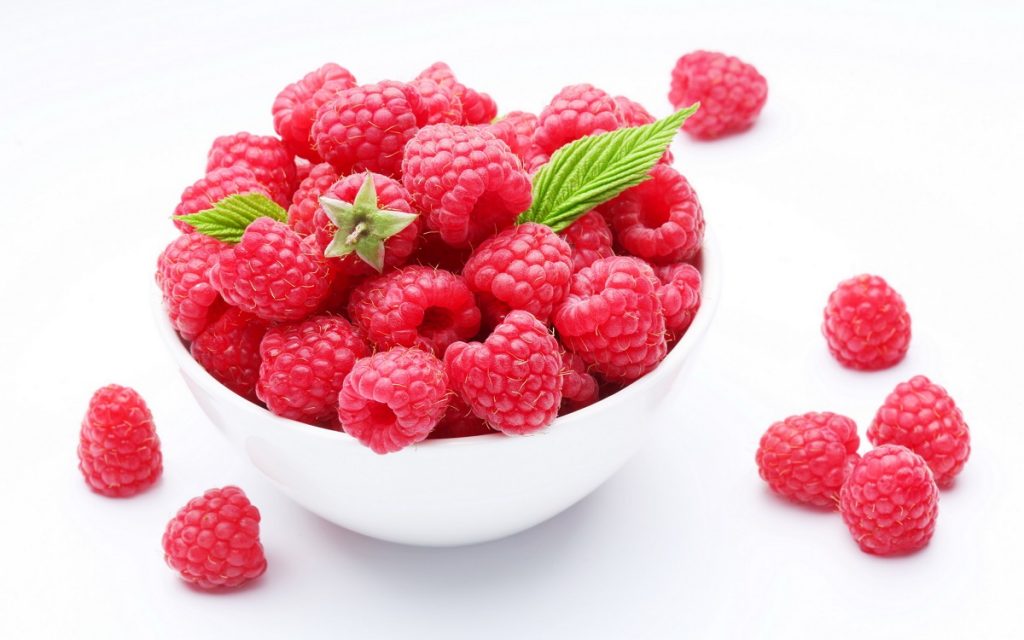
About Raspberry – Good Things Come In Small, Ruby Red Packages. A juicy, bite-sized treat that collapses into a delicious, refreshing pulp as soon as you pop it into your mouth!
Characterized by their delicious flavor- both sweet and tart but in a subtle, mouth-watering way- raspberries command a large fan following. Unfortunately, this luscious berry is not available all year round. In some countries, it is available from June to October.
Raspberries are also referred to as ‘aggregate fruits’ due to the presence of drupelets (miniscule fruits that contain seeds), which account for the raspberries’ unique appearance. Though red raspberries are the most common variety, this delicate fruit is available in a plethora of colors including black, purple and orange!
Let’s take a look at the nutritional content and health benefits of raspberries.
Table of Contents
Raspberry Nutritional Information
This aromatic berry delight is quite the powerhouse of nutrients. One cup of fresh, juicy raspberries (about 123 grams) contains substantial quantities of Vitamin C (53.7%), Vitamin K (11.9%) and Vitamin E (5.3%)
Raspberries are also rich sources of numerous minerals including manganese (41%), magnesium (6.7%), copper (5.5%) and potassium (5.3%). Looking for a fruit that provides adequate dietary fiber and has a low calorie count? Raspberries are exactly what you need! With a whopping 31.9% of fiber content, this wholesome fruit helps to keep your digestive system functioning smoothly. Moreover, one cup of raspberries only has 63 calories! Whether you have this fruit in its fresh form or consume it as refreshing raspberry juice, make sure to include it in your diet whenever it is available.
Health Benefits of Raspberries
High Antioxidant Content!
Raspberries contain generous amounts of Vitamin C and anthocyanins. These substances help to protect the body from a series of bacterial and viral agents that can cause diseases that range from the common cold and fever, to various grave heart problems. Why should you choose raspberries over other fruits that also contain antioxidants? Because research has concluded that the antioxidant content in raspberries is three times greater than that of kiwis and 50% more than that of strawberries! The flavanoid substances in raspberries also restrict the growth of detrimental bacteria in the body.
Raspberries Protect You Fom Cancer!
Research findings state that raspberries contain a distinctive compound known as ellagitannin. This compound is well recognized for its anti-cancer properties and ability to inhibit the growth of cancer cells. What’s more, the ellagitannin levels in raspberries are not adversely affected even if the fruit is stored or frozen for later use!
Good For The Eyes!
Raspberries contain a particularly winning combination of vitamins which act as invincible forces against age-related eye diseases such as macular degeneration and glaucoma. Three daily servings of fruits rich in Vitamin A and Vitamin E, such as raspberries, can dramatically reduce the risks of falling prey to these severe eye diseases.
For That Extra Dose of Vitamin K!
Vitamin K is recognized for the numerous health benefits that it provides to your body. For fortified bones, reduced risk of blood clotting, maintenance of optimal brain health and excellent anti-inflammatory effects, include raspberries in your shopping cart whenever you spot them in your local supermarket!
Possible Ways to Enjoy Raspberries
Aromatic, fresh raspberries, especially when they are chilled, are an absolutely irresistible treat! Add this juicy fruit to your morning cereal to stock up on all the nutrients that the raspberry has to offer. You can also add raspberries to a bowl of sweet yoghurt, or spread a thick layer of raspberry jam onto a slice of lightly toasted bread for a delicious, mid-day snack! Scatter a few raspberries onto freshly made waffles or pancakes, and relish this flavorsome topping.
Remember that raspberries are delicate fruits and bruise easily. Wash them gently and do not expose them to sunlight as they will quickly get mushy and lose their fresh, juicy consistency.
Possible Health Concerns
Raspberries contain oxalates which can crystallize to form kidney or gall bladder stones. Those people who are susceptible to kidney or gall bladder stone formation should refrain from eating raspberries.